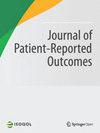Reliability and validity of the German version of the University of Jyvaskyla Active Aging Scale (UJACAS-G)
IF 2.4
Q2 HEALTH CARE SCIENCES & SERVICES
引用次数: 0
Abstract
The University of Jyvaskyla Active Aging Scale (UJACAS) assesses active aging through willingness, ability, opportunity, and frequency of involvement in activities. Recognizing the lack of a German version, the Finnish original was translated (UJACAS-G). This study aimed: (1) to evaluate the test-retest reliability of UJACAS-G; and (2) to explore correlations with health-related parameters (concurrent validity). The study (test-retest design) targeted healthy older adults aged 65+. Reliability of UJACAS-G (total and subscores) was assessed using Bland-Altman analyses and Intraclass Correlation Coefficients (ICCs). Furthermore, correlations (Spearman’s rho) between UJACAS-G scores and physical function (walking speed, handgrip strength, balance, 6-minute walk distance), physical activity (International Physical Activity Questionnaire), life-space mobility (Life-Space Assessment), and health-related quality of life (Short Form-36 Health Survey) were calculated. Bland-Altman analyses (N = 60; mean age 72.3, SD 5.9 years; 50% women) revealed mean differences close to zero and narrow limits of agreement for all scores (total score: mean difference −1.9; limits −31.7 to 27.9). The ability subscore showed clustering at its upper limit. ICC was 0.829 (95% CI 0.730 to 0.894) for the total score and ranged between 0.530 and 0.876 for subscores (all p-values < 0.001). The total score correlated with walking speed (rho = 0.345; p = 0.008), physical activity (rho = 0.279; p = 0.033) and mental health (rho = 0.329; p = 0.010). UJACAS-G is reliable for assessing active aging among German-speaking healthy older adults. A potential ‘ceiling effect’ regarding the ability subscore should be considered when applying UJACAS-G to well-functioning populations. Analyses of concurrent validity indicated only weak correlations with health-related parameters.日瓦斯基拉大学积极老龄化量表德语版(UJACAS-G)的可靠性和有效性
耶瓦斯基拉大学积极老龄化量表(UJACAS)通过参与活动的意愿、能力、机会和频率对积极老龄化进行评估。由于缺乏德语版本,芬兰语原版已被翻译成德语(UJACAS-G)。本研究旨在:(1)评估 UJACAS-G 的重测可靠性;(2)探讨与健康相关参数的相关性(并发有效性)。研究(重测设计)的对象是 65 岁以上的健康老年人。通过布兰-阿尔特曼分析和类内相关系数(ICC)评估了 UJACAS-G(总分和副分)的可靠性。此外,还计算了 UJACAS-G 分数与身体功能(步行速度、手握力量、平衡能力、6 分钟步行距离)、体力活动(国际体力活动问卷)、生活空间活动能力(生活空间评估)和健康相关生活质量(短表-36 健康调查)之间的相关性(Spearman's rho)。布兰-阿尔特曼分析(N = 60;平均年龄 72.3 岁,标准差 5.9 岁;50% 为女性)显示,所有分数的平均差均接近零,且一致性限值较小(总分:平均差-1.9;限值-31.7 至 27.9)。能力子分数在其上限处出现聚类。总分的 ICC 为 0.829(95% CI 0.730 至 0.894),各子分数的 ICC 在 0.530 和 0.876 之间(所有 p 值均小于 0.001)。总分与步行速度(rho = 0.345;p = 0.008)、体力活动(rho = 0.279;p = 0.033)和心理健康(rho = 0.329;p = 0.010)相关。UJACAS-G 可以可靠地评估德语健康老年人的积极老龄化状况。在将 UJACAS-G 应用于功能良好的人群时,应考虑到能力子分数的潜在 "天花板效应"。同时有效性分析表明,UJACAS-G 与健康相关参数之间的相关性较弱。
本文章由计算机程序翻译,如有差异,请以英文原文为准。
求助全文
约1分钟内获得全文
求助全文
来源期刊

Journal of Patient-Reported Outcomes
Health Professions-Health Information Management
CiteScore
3.80
自引率
7.40%
发文量
120
审稿时长
20 weeks
 求助内容:
求助内容: 应助结果提醒方式:
应助结果提醒方式:


